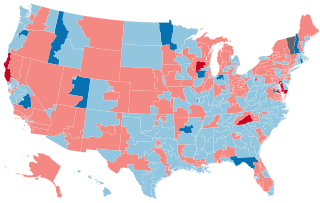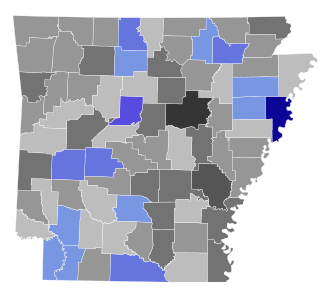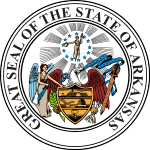
George Washington Hays was an American politician who served as the 24th Governor of Arkansas from 1913 to 1917.

The governor of Oregon is the head of government of Oregon and serves as the commander-in-chief of the state's military forces. The title of governor was also applied to the office of Oregon's chief executive during the provisional and U.S. territorial governments.

The 1990 United States House of Representatives elections was an election for the United States House of Representatives on November 6, 1990, to elect members to serve in the 102nd United States Congress. They occurred in the middle of President George H. W. Bush's term. As in most midterm elections, the president's Republican Party lost seats to the Democratic Party, slightly increasing the Democratic majority in the chamber. It was a rare instance, however, in which both major parties lost votes to third parties such as the Libertarian Party as well as independent candidates.

The 1912–13 United States Senate elections were held on various dates in various states. They were the last U.S. Senate elections before the ratification of the Seventeenth Amendment in 1913, establishing direct elections for all Senate seats. Senators had been primarily chosen by state legislatures. Senators were elected over a wide range of time throughout 1912 and 1913, and a seat may have been filled months late or remained vacant due to legislative deadlock. Some states elected their senators directly even before passage of Seventeenth Amendment. Oregon pioneered direct election and experimented with different measures over several years until it succeeded in 1907. Soon after, Nebraska followed suit and laid the foundation for other states to adopt measures reflecting the people's will. By 1912, as many as 29 states elected senators either as nominees of their party's primary or in conjunction with a general election.

The Democratic Party of Arkansas is the affiliate of the Democratic Party in the state of Arkansas. The current party chair is Grant Tennille. Former U.S. president Bill Clinton was born in Arkansas, and served as state governor from 1979 to 1981 and 1983 to 1992.
The following table indicates the party of elected officials in the U.S. state of Arkansas:

The 1992 United States elections elected state governors, the president of the United States, and members of the 103rd United States Congress. The election took place after the Soviet Union crumbled and the Cold War ended, as well as the redistricting that resulted from the 1990 census. Often considered "The Year Of The Woman," these elections brought an increased number of female politicians to Washington such as Dianne Feinstein (D-CA) and Carol Moseley Braun (D-IL). Governor Bill Clinton of Arkansas defeated incumbent president George H. W. Bush and businessman Ross Perot in the presidential election. The Democratic Party maintained their control of both chambers of Congress. This is the first Democratic trifecta since the Republican victory in the 1980 elections, the last one in the 20th century, and the last one overall until 2008.

The 1978 United States elections were held on November 7, 1978, to elect the members of the 96th United States Congress. The election occurred in the middle of Democratic President Jimmy Carter's term. Democrats retained control of both houses of Congress.

The 1986 Arkansas gubernatorial election was conducted on November 4, 1986, to elect the Governor of Arkansas.

The 1958 Arkansas gubernatorial election was held on November 4, 1958.

The 1937 Arkansas special senatorial election was held on October 19, 1937, following the death of longtime Democratic senator Joe T. Robinson. Robinson was a powerful senator, staunch Democrat, and strong supporter of United States President Franklin D. Roosevelt, and was instrumental in passing many New Deal programs through the Senate. Arkansas was essentially a one-party state during the Solid South period; the Democratic Party controlled all aspects of state and local office. Recently elected Democratic Governor of Arkansas Carl E. Bailey initially considered appointing himself to finish Robinson's term, but later acceded to a nomination process by the Democratic Central Committee, avoiding a public primary but breaking a campaign process. Avoiding the primary so angered the public and establishment Democrats, leading them to coalesce behind longtime Democrat John E. Miller as an independent, forcing a general election.

United States gubernatorial elections were held in 1913, in four states. Massachusetts at this time held gubernatorial elections every year. It would abandon this practice in 1920. New Jersey at this time held gubernatorial elections every 3 years. It would abandon this practice in 1949. Virginia holds its gubernatorial elections in odd numbered years, every 4 years, following the United States presidential election year.

The 1930 Arkansas gubernatorial election was held on November 4, 1930, to elect the governor of Arkansas, concurrently with the election to Arkansas's Class II U.S. Senate seat, as well as other elections to the United States Senate in other states and elections to the United States House of Representatives and various state and local elections.

United States gubernatorial elections were held in 1912, in 33 states, concurrent with the House, Senate elections and presidential election, on November 5, 1912. In addition, there was a special election in Georgia on January 10, 1912.

The 1912 Illinois gubernatorial election was held on November 5, 1912. Incumbent second-term Republican governor Charles S. Deneen was defeated by the Democratic nominee, former mayor of Chicago Edward Fitzsimmons Dunne.

The 1916 Arkansas gubernatorial election was held on November 7, 1916.

The 1914 Arkansas gubernatorial election was held on September 14, 1914.

The 1946 Arkansas gubernatorial election was held on November 5, 1946.

The 1922 Arkansas gubernatorial election was held on October 3, 1922.





















